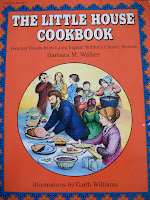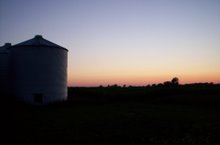I was looking through all the junk I keep crammed under the guest bed when I came across something I had forgotten completely.
At some point my Mom or Grandma had bought this orange cookbook full of odd, old-fashioned recipes. When my Mom wanted to get rid of it at a garage sale, I took it for myself. I didn’t know how she could get rid of something so infinitely interesting… and then it got packed away and I’ve barely looked at it since.
The book is The Little House Cookbook by Barbara M. Walker. It’s a book full of recipes mentioned in any of the fantastic Little House books or recipes that pioneers would have been making around the time Laura Ingalls Wilder’s family was traversing the Midwest. I’m a big history buff—especially the social aspect of history. Not necessarily wars or political disasters, but what were the everyday people thinking, feeling doing?
So, when I came across this book again I opened it up and looked through it. I was amazed to find just as many (if not more) words and explanations as recipes. I began to read the forward and was struck by how perfect Ms. Walker’s words seemed to fit with the ideas of simplicity, eating locally and even sustainability.

“They [the recipes] turn out to be a wonderful way to rediscover basic connections, links that are often obscured in the complex modern world. By this I mean connections among the food on the table, the grain in the field, and the cow in the pasture. Between the food on the table and the sweat of someone’s brow. Between the winter and dried apples, the summer and tomatoes, the autumn and fresh sausage. Between the labors of the pioneers and the abundance we enjoy today. Between children and their elders. Between the preparation of a meal and the experience of love.”
Walker’s words are undeniably perfect for this generation. She points to a point Joan Dye Gussow also brings up in her book This Organic Life. Many people don’t make the connection between what they eat and the farmers that produce the food. Many children haven’t any idea how onions or celery or peaches grow. There’s no connection. We simply, as a nation, do not seem to care where our food comes from as long as its cheap and convenient.
I think a lot of the local movements and homesteading movements stem from a wish to have all
those connections back. My Dad often makes fun of my love for old things, pointing out that I wouldn’t want to live without plumbing or running water. I try to explain I don’t want to transport myself back to that time, but I would like some of the values of community and food to be transported to our time. Pioneers and all those that came before the industrial age did what they did out of necessity. If they didn’t plant vegetables or have some kind of food source,
they died. Many of us are so lucky not to have that kind of threat hanging over our heads, but it doesn’t mean we should allow our ignorance to threaten our planet and our own health.
I’m getting a bit soapbox-y and a bit rambly again, so I’ll just say this. What I want from my life is to understand those connections between the food on the table and sweat of someone’s brow. I want to pass this to my children should I be lucky enough to have them. These new choices I’m making are to increase my connection to the land, to what I eat and an attempt to rememember my good fortune to have all that I have and not always be wanting more, faster, easier, and cheaper.






3 comments:
Just a note to thank you for adding me to your blog roll. I grew up in St. Louis (Des Peres, Webster Groves), so I was delighted to find your blog.
I teach a contemporary nature literature course, and this topic comes up sometimes. I'll ask, "Who here can figure out where their food comes from?" What's cool is that I usually do have a few students who grew up on family farms and know exactly where their food comes from. The rest of us have to make guesses.
I agree that it's an important thing to think about. Food it, after all, one of our deepest connections to the earth. Without it, we die.
Pablo, Jo(e), thank you for your comments! I enjoy reading each of your blogs.
Jo(e), absolutely, food is one of our deepest connections with the earth.
Thanks!
Post a Comment